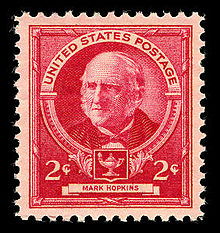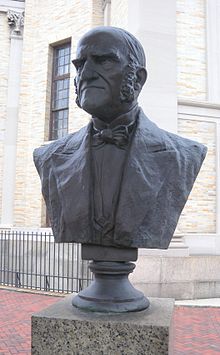- Mark Hopkins (educator)
-
Mark Hopkins (February 4, 1802 – June 17, 1887) was an American educator and theologian.
Contents
Life and career
Great-nephew of the theologian Samuel Hopkins, Mark Hopkins was born in Stockbridge, Massachusetts. He graduated in 1824 from Williams College, where he was a tutor in 1825-1827, and where in 1830, after having graduated in the previous year from the Berkshire Medical College at Pittsfield, he became professor of Moral Philosophy and Rhetoric. In 1833 he was licensed to preach in Congregational churches. He was president of Williams College from 1836 until 1872. He was one of the ablest and most successful of the old type of college president. He married Mary Hubble in 1832 and together they parented ten children.
According to the biographical article on Hopkins that appears in American Authors 1600-1900, "It was President Garfield who first, at a dinner of Williams alumni, defined a university as 'Mark Hopkins on one end of a log and a student on the other.' " (p. 384).
His volume of lectures on Evidences of Christianity (1846) was delivered as a series of lectures at the Lowell Institute in January 1844. The book became a favorite text-book in American Christian apologetics being reprinted in many editions up until 1909. Although not trained as a lawyer Hopkins held a lifelong interest in the law and aspects of his argument in Evidences of Christianity reflects legal metaphors and language about the veracity of eyewitness testimony to the events in the life of Jesus Christ. Much of his apologetic arguments though were a restatement of views that had been previously presented by earlier apologists such as William Paley and Thomas Hartwell Horne.
Of his other writings, the chief were Lectures on Moral Science (1862), The Law of Love and Love as a Law (1869), An Outline Study of Man (1873), The Scriptural Idea of Man (1883), and Teachings and Counsels (1884). Dr Hopkins took a lifelong interest in Christian missions, and from 1857 until his death was president of the American Board of Commissioners for Foreign Missions (the American Congregational Mission Board). He died at Williamstown, on 17 June 1887.
His son, Henry Hopkins (1837-1908), was also from 1903 till his death president of Williams College. Mark Hopkins's brother, Albert Hopkins (1807-1872), was long associated with him at Williams College, where he graduated in 1826 and was successively a tutor (1827-1829), professor of mathematics and natural philosophy (1829-1838), professor of natural philosophy and astronomy (1838-1868) and professor of astronomy (1868-1872). In 1835 he organized and conducted a natural history expedition to Joggins, Nova Scotia, said to have been the first expedition of the kind sent out from any American college, and in 1837, at his suggestion and under his direction, an astronomical observatory was built at Williams College, said to have been the first in the United States built at a college exclusively for the purposes of instruction.
References
- "Mark Hopkins," in American Authors 1600 -1900: A Biographical Dictionary of American Literature, edited by Stanley J. Kunitz and Howard Haycraft, (New York: H. W.Wilson Company, 1964), pp. 383-384.
- Entry on Hopkins in Philip Johnson, "Juridical Apologists 1600 - 2000 AD: A Bio-Bibliographical Essay," Global Journal of Classical Theology, Vol. 3, no. 1 (March 2002)[1]
- John Wright Buckham, "The New England Theologians," The American Journal of Theology, vol. 24, no. 1 (January 1920), pp. 19-29.
- C. H. Lippy, "Mark Hopkins," in Dictionary of Christianity in America, edited by Daniel G. Reid, Robert D. Linder, Bruce L. Shelley & Harry S. Stout, (Downers Grove: InterVarsity Press,1990), p.553. ISBN 0-8308-1776-X
 This article incorporates text from a publication now in the public domain: Chisholm, Hugh, ed (1911). Encyclopædia Britannica (11th ed.). Cambridge University Press.
This article incorporates text from a publication now in the public domain: Chisholm, Hugh, ed (1911). Encyclopædia Britannica (11th ed.). Cambridge University Press.Topics
External links
- Lectures on the Evidences of Christianity available at Making of America books University of Michigan[2]
- Significant American Professors of Philosophy, natural Philosophy and Theology from 1637-1920 [3]
Academic offices Preceded by
Edward Dorr GriffinPresident of Williams College
1836–1872Succeeded by
Paul ChadbourneCategories:- 1802 births
- 1887 deaths
- American academics
- American theologians
- Christian apologists
- People from Berkshire County, Massachusetts
Wikimedia Foundation. 2010.


